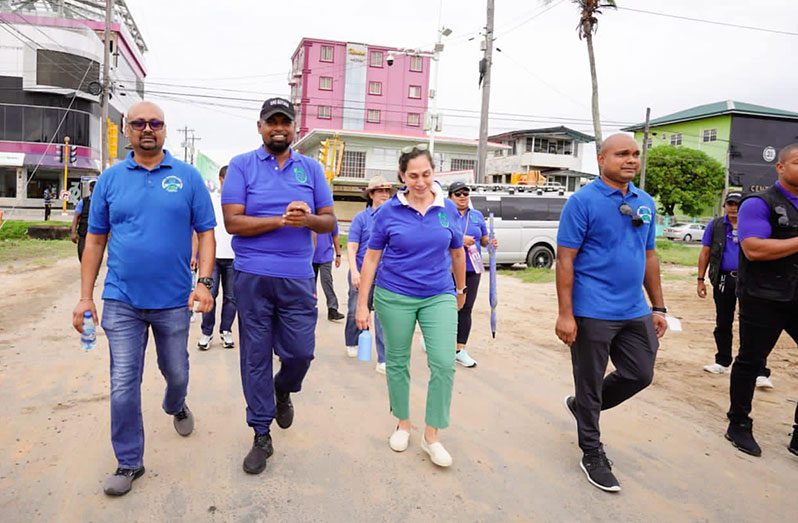-says Guyana needs over $1B to protect coastline
PRESIDENT, Dr. Irfaan Ali has called on world leaders to end the “gyaffing” and ensure the fulfilment of the $100 billion pledge to tackle climate change which is mostly affecting developing countries, including Guyana.
The President opined that more must be done by the developed world to address issues of survival in a sustainable manner, noting that this has to be done through partnerships.
He made these statements on Sunday at the ‘Green Day’ walk organised by the Environmental Protection Agency (EPA) in observance of World Environment Day.
The Head of State said that as time goes on, the effects of climate change are being felt by every country around the world, especially in developing countries.
He noted that with the developed world not taking up their responsibility when it comes to climate change, countries like Guyana must take a balanced approach and explore every possible revenue-generating activity to mobilise the resources necessary for climate change adaptation and mitigation.
“We have been consistently calling on the developed world to stay true to the pledges they made. We are far away from the minimal $100 billion pledge that the developed world would have made to fight climate change, adaptation, and mitigation measures. If you look at adaptation alone, just for adaptation measures in the developing economies, it will cost between $140 billion to $300 billion annually if we are to successfully meet adaptation costs alone by 2030,” President Ali said.
He noted that according to recent data, the sea level is expected to rise between 10 to 21 1/2 inches in the 21st century. This, he explained, poses a direct threat to Guyana which would need to find more than $1 billion in adaptation financing for the 425 kilometres of coastline that is needed to protect the country.
REAL WORK
He noted that with developing countries having to pick up the “slack” left by the developed world, real work must be undertaken to finance mitigating efforts to tackle the effects of climate change.
“It has to come from real work in the economy from the productive sector. That is where it must come from. Because so far, what you’re seeing in the world is an unwillingness to pay the true costs of the damage that was created.”
President Ali said that government has been working on policy formulation that seeks to build a country that is resilient to all threats whether it is climate, food, or water. He highlighted Guyana’s Low Carbon Development Strategy (LCDS) which, he noted, is also seeking to strike a balance between the growth and development of the country.
Further, the Head of State noted that while Guyana is in support of the move to more environmentally protective measures such as more solar and wind energy use and clean hydrogen, the reality is that developing countries cannot financially sustain this transition alone.
“Yes, we must because it is good for the planet. It is healthy for the planet. But let’s be realistic, at the current capital costs, how many developing countries can afford this transition? And who is paying for the transition? These are questions that cannot be left unanswered. These are questions that must be answered in the policy formulation and policy mix that we must pursue. And I’m saying we must pursue.”
The Head of State opined that world leaders must call out those who need to be a part of the solution but are not taking responsibility.
Meanwhile, President Ali noted that his call for the developed world to act on climate change mitigation does not negate the individual responsibility of Guyanese in this fight
“We here in Guyana need to change our style and our culture with the way we treat the environment. We must all understand that we need to take individual responsibility. If each one of us recommits ourselves to treating the environment in a more respectable way; if we recommit to pursuing a path in which we see littering as a sin and an injury to humanity, then we will be able to make an individual change,” he said.
He noted that when we make those individual changes, we’ll be able to pursue collective action which could create a national movement that can move the international community.




.png)









